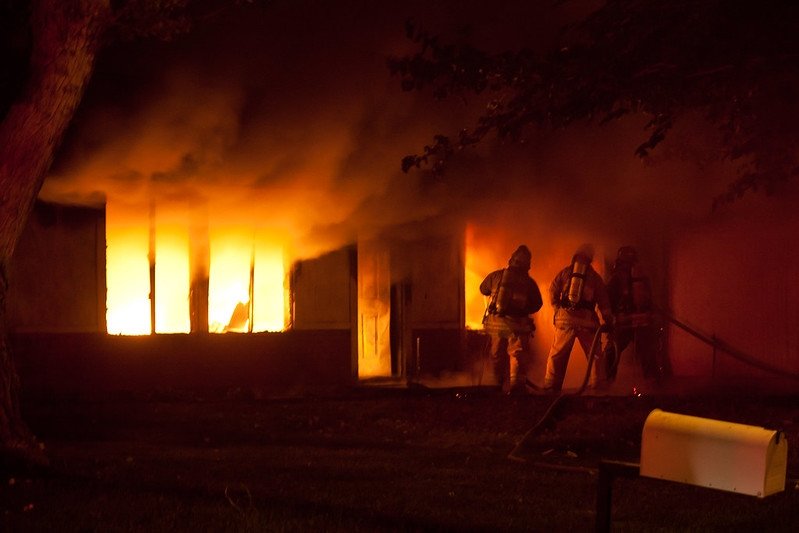Table of Contents Show
Each year, 358,500 homes are damaged by structural fires.

As you can imagine, homeowners worry constantly that they’ll wake up to find their property engulfed in flames. Because preventing a fire isn’t as simple as telling yourself not to worry.
For those hoping to keep their families safe, it’s important to know fire safety tips and how to keep your family and property safe from fire hazards. Keep reading to learn strategies you can use to keep your family and home safe from devastating house fires.
Keep Your Stove and Oven Clean
Most house fires start in the kitchen, so it’s important to keep your stove and oven clean to prevent a fire. Grease and food can build up on your stovetop and in your oven. If it’s not cleaned regularly, it can act as fuel for a fire.
A clean stove and oven are less likely to overheat and cause a fire. When cooking, pay attention to what you are cooking. Don’t leave food unattended. Turn off the stove and oven when you’re finished cooking.
Don’t Leave Candles Burning Unattended
Always be sure to keep an eye on any candles that are burning in your home. If you leave them unattended, they could easily start a fire.
To prevent this, make sure to blow them out before you leave the room. If you have any children or pets, be especially careful to keep them away from candles.
Read Also:
Keep a Fire Extinguisher Handy
A fire extinguisher is a crucial tool to have in your home in case of a fire. By keeping one handy, you can quickly put out a small fire before it has a chance to spread. It can also help prevent a house fire from getting out of control.
Fire extinguishers are typically labeled with instructions on how to use them. It is important to familiarize yourself with the types of extinguishers and how they work before a fire breaks out.
If a fire does start, identify the type of fire extinguisher that should be used and follow the directions on the label. Be sure to aim the extinguisher at the base of the fire. And keep in mind that the extinguisher may only have a limited amount of time to work, so it is important to act quickly.
Have Working Smoke Detectors
Smoke detectors are one of the most important fire safety devices in your home. Having working smoke detectors can help to prevent a house fire.
Smoke detectors should be installed on every level of your home, including the basement. Test your smoke detectors monthly to ensure that they are working properly. And replace the batteries every year.
Keep Flammable Items Away From Children
Children are curious and may play with matches or candles if they find them. If these items are left within reach, a fire could start.
Keep lighters and matches up high, out of children’s sight and reach. Store flammable liquids, such as gasoline, in sealed containers away from the house. Do not leave them in the garage or on the porch.
Keep Your Home Clean and Free of Clutter
A messy home is a fire hazard. A cluttered home is more likely to have a house fire because there are more things for the fire to burn.
To prevent a house fire, it is important to keep your home clean and free of clutter. This means regularly cleaning up any messes, dusting, and vacuuming. It is also important to declutter your home on a regular basis. This means getting rid of any items that you no longer use or need.
Have a Plan in Case of Fire
Having a plan gives you a clear course of action to take, and helps to ensure that everyone in the home is on the same page. Without a plan, it is easy to become panicked and make mistakes that could put the home and everyone in it at risk.
In the event that a fire does start, it is important to have a plan in place to prevent it from spreading and causing extensive damage. The first step is to identify the source of the fire and try to contain it as much as possible.
If the fire is small and contained, you may be able to extinguish it with a fire extinguisher. However, if the fire is larger or out of control, you will need to evacuate the premises immediately and call 911.
It is also important to include homeowner insurance in your plan. A standard policy will cover the cost of repairing or rebuilding your home. This also includes any personal belongings that were damaged or destroyed in the fire. Learn more info to protect your investment and choose a policy that provides the right amount of coverage for your needs.
Be Careful With Electrical Appliances
It is always important to be careful with electrical appliances to prevent a fire in the home. Make sure to never overload outlets, and keep cords and wires away from water. Never leave appliances running when you are not home.
If an appliance does overheat, unplug it immediately and take it outside to cool down. Be sure to keep an eye on your electrical appliances and never hesitate to call a professional if something does not seem right.
Be especially careful with space heaters. Always follow the manufacturer’s instructions when using a space heater. Be sure to keep flammable objects, such as furniture, pillows, and blankets, at least three feet away from the heater. Never leave a space heater unattended. When you’re finished using it, be sure to turn it off and unplug it.
Protection Against House Fire
There are many things you can do in preventing house fires, but the most important thing is to be aware of the potential dangers and take precautions.
Be sure to keep flammable materials away from heat sources, never leave cooking unattended, and have a plan for dealing with electrical problems. Keep your family safe by being prepared. Was this helpful? If so, please keep reading for more informative home guides.









